#write tip
Text
DO NOT DO THIS!!!
If a website has a paywall, like New York Times, DO NOT use the ctrl+A shortcut then the ctrl+c shortcut as fast as you can because then you may accidentally copy the entire article before the paywall comes up. And definitely don't do ctrl+v into the next google doc or whatever you open because then you will accidentally paste the entire article into a google doc or something!!!! I repeat DO NOT do this because it is piracy which is absolutely totally wrong!!!
110K notes
·
View notes
Text
A general cane guide for writers and artists (from a cane user, writer, and artist!)
Disclaimer: Though I have been using a cane for 6 years, I am not a doctor, nor am I by any means an expert. This guide is true to my experience, but there are as many ways to use a cane as there are cane users!
This guide will not include: White canes for blindness, crutches, walkers, or wheelchairs as I have no personal experience with these.
This is meant to be a general guide to get you started and avoid some common mishaps/misconceptions in your writing, but you absolutely should continue to do your own research outside of this guide!
This is NOT a medical resource!!! And never tell a real person you think they're using a cane wrong!
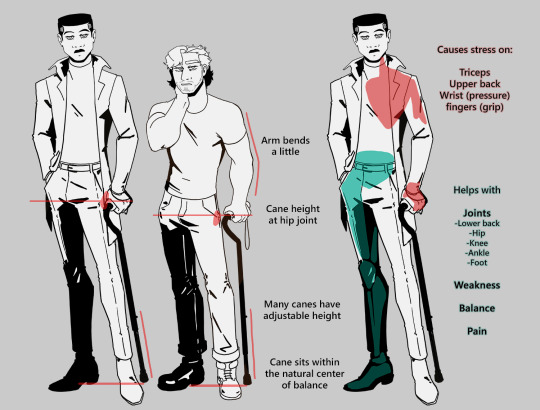
The biggest recurring problem I've seen is using the cane on the wrong side. The cane goes on the opposite side of the pain! If your character has even-sided pain or needs it for balance/weakness, then use the cane in the non-dominant hand to keep the dominant hand free. Some cane users also switch sides to give their arm a rest!
A cane takes about 20% of your weight off the opposite leg. It should fit within your natural gait and become something of an extension of your body. If you need more weight off than 20%, then crutches, a walker, or a wheelchair is needed.
Putting more pressure on the cane, using it on the wrong side, or having it at the wrong height can make it less effective, and can cause long term damage to your body from improper pressure and posture. (Hugh Laurie genuinely hurt his body from years of using a cane wrong on House!)
(some people elect to use a cane wrong for their personal situation despite this, everyone is different!)
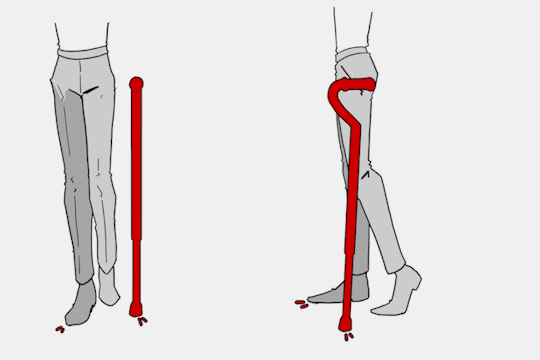
(an animated GIF of a cane matching the natural walking gait. It turns red when pressure is placed on it.)
When going up and down stairs, there is an ideal standard: You want to use the handrail and the cane at the same time, or prioritize the handrail if it's only on one side. When going up stairs you lead with your good leg and follow with the cane and hurt leg together. When going down stairs you lead with the cane and the bad leg and follow with the good leg!
Realistically though, many people don't move out of the way for cane users to access the railing, many stairs don't have railings, and many are wet, rusty, or generally not ideal to grip.
In these cases, if you have a friend nearby, holding on to them is a good idea. Or, take it one step at a time carefully if you're alone.
Now we come to a very common mistake I see... Using fashion canes for medical use!
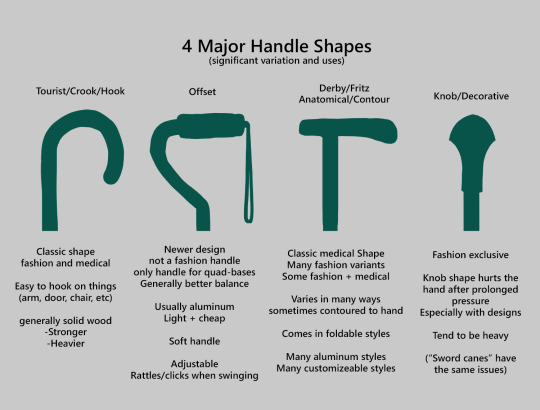
(These are 4 broad shapes, but there is INCREDIBLE variation in cane handles. Research heavily what will be best for your character's specific needs!)
The handle is the contact point for all the weight you're putting on your cane, and that pressure is being put onto your hand, wrist, and shoulder. So the shape is very important for long term use!
Knob handles (and very decorative handles) are not used for medical use for this reason. It adds extra stress to the body and can damage your hand to put constant pressure onto these painful shapes.
The weight of a cane is also incredibly important, as a heavier cane will cause wear on your body much faster. When you're using it all day, it gets heavy fast! If your character struggles with weakness, then they won't want a heavy cane if they can help it!
This is also part of why sword canes aren't usually very viable for medical use (along with them usually being knob handles) is that swords are extra weight!
However, a small knife or perhaps a retractable blade hidden within the base might be viable even for weak characters.
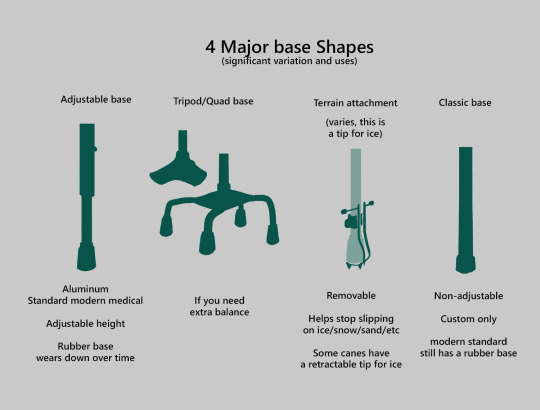
Bases have a lot of variability as well, and the modern standard is generally adjustable bases. Adjustable canes are very handy if your character regularly changes shoe height, for instance (gotta keep the height at your hip!)
Canes help on most terrain with their standard base and structure. But for some terrain, you might want a different base, or to forego the cane entirely! This article covers it pretty well.
Many cane users decorate their canes! Stickers are incredibly common, and painting canes is relatively common as well! You'll also see people replacing the standard wrist strap with a personalized one, or even adding a small charm to the ring the strap connects to. (nothing too large, or it gets annoying as the cane is swinging around everywhere)
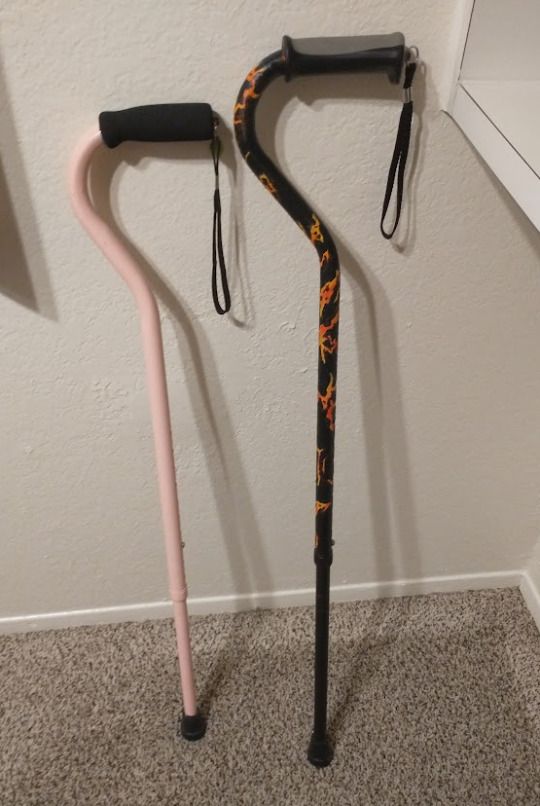
(my canes, for reference)
If your character uses a cane full time, then they might also have multiple canes that look different aesthetically to match their outfits!
When it comes to practical things outside of the cane, you reasonably only have one hand available while it's being used. Many people will hook their cane onto their arm or let it dangle on the strap (if they have one) while using their cane arm, but it's often significantly less convenient than 2 hands. But, if you need 2 hands, then it's either setting the cane down or letting it hang!
For this reason, optimizing one handed use is ideal! Keeping bags/items on the side of your free hand helps keep your items accessible.
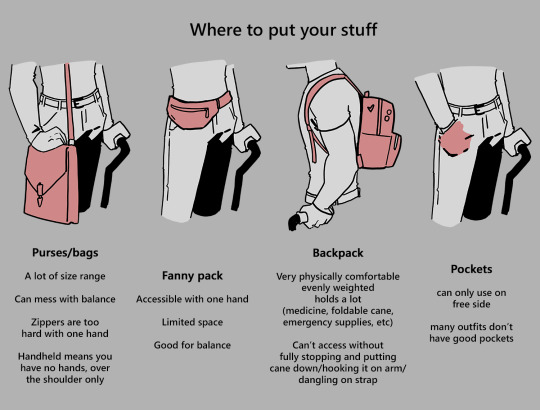
When sitting, the cane either leans against a wall or table, goes under the chair, or hooks onto the back of the chair. (It often falls when hanging off of a chair, in my experience)
When getting up, the user will either use their cane to help them balance/support as they stand, or get up and then grab their cane. This depends on what it's being used for (balance vs pain when walking, for instance!)
That's everything I can think of for now. Thank you for reading my long-but-absolutely-not-comprehensive list of things to keep in mind when writing or drawing a cane user!
Happy disability pride month! Go forth and make more characters use canes!!!
#mobility aid#cane user#writing tips#writing advice#drawing tips#art tutorial#art tips#art reference#art resources#art help#my art#long post
73K notes
·
View notes
Text
If you want to write a dumb little story with a dumb little plot and ridiculously silly characters. No one's stopping you. Genuinely, no one should be allowed to stop you. Write that dumb story with your whole heart and don't hold back.
#look I've deleted fics that made me feel awful#There's a time and a place#A good idea will come back to you again#But some things should be given time to settle#writeblr#writing tips#writing#writer advice#writers on tumblr
71K notes
·
View notes
Text
things people do after having a nightmare that isn’t crying
struggle to catch their breath
grab onto whatever’s close enough to ground themselves in reality
become nauseous / vomit
shake uncontrollably
sweat buckets
get a headache
things people do to combat having nightmares if they occur commonly
sleep near other people so they can hear the idle sounds of them completing tasks
move to a different sleeping spot than where they had the nightmare
leave tvs / radios / phones on with noise
just not sleep (if you want to go the insomnia route)
sleep during the day in bright rooms
things people with insomnia do
first, obviously, their ability to remember things and their coordination will go out the window
its likely they’ll become irritable or overly emotional
their body will start to ache, shake, and weaken
hallucinate if it’s been long enough
it becomes incredibly easy for them to get sick (and they probably will)
add your own in reblogs/comments!
33K notes
·
View notes
Text
The symbolism of flowers
Flowers have a long history of symbolism that you can incorporate into your writing to give subtext.
Symbolism varies between cultures and customs, and these particular examples come from Victorian Era Britain. You'll find examples of this symbolism in many well-known novels of the era!
Amaryllis: Pride
Black-eyed Susan: Justice
Bluebell: Humility
Calla Lily: Beauty
Pink Camellia: Longing
Carnations: Female love
Yellow Carnation: Rejection
Clematis: Mental beauty
Columbine: Foolishness
Cyclamen: Resignation
Daffodil: Unrivalled love
Daisy: Innocence, loyalty
Forget-me-not: True love
Gardenia: Secret love
Geranium: Folly, stupidity
Gladiolus: Integrity, strength
Hibiscus: Delicate beauty
Honeysuckle: Bonds of love
Blue Hyacinth: Constancy
Hydrangea: Frigid, heartless
Iris: Faith, trust, wisdom
White Jasmine: Amiability
Lavender: Distrust
Lilac: Joy of youth
White Lily: Purity
Orange Lily: Hatred
Tiger Lily: Wealth, pride
Lily-of-the-valley: Sweetness, humility
Lotus: Enlightenment, rebirth
Magnolia: Nobility
Marigold: Grief, jealousy
Morning Glory: Affection
Nasturtium: Patriotism, conquest
Pansy: Thoughtfulness
Peony: Bashfulness, shame
Poppy: Consolation
Red Rose: Love
Yellow Rose: Jealously, infidelity
Snapdragon: Deception, grace
Sunflower: Adoration
Sweet Willian: Gallantry
Red Tulip: Passion
Violet: Watchfulness, modesty
Yarrow: Everlasting love
Zinnia: Absent, affection
#writers#creative writing#writing community#writing#writers of tumblr#writing inspiration#creative writers#writeblr#writerblr#writing tips#flower symbolism#writing subtext#writblr#writers corner#how to write subtext#symbolism in writing#writing advice#creative writing tips#writing resources#writing help#writer tips#writing tips and tricks#helping writers#help for writers#references for writers#writing reference#writers block#beat writers block#novel writing
48K notes
·
View notes
Text
Pirate Terms and Phrases
-> Pirate Lingo
-> A Pirate's Glossary
Batten Down The Hatches - tie everything down and put stuff away for a coming storm.
Brig - a prison on a ship.
Bring a Spring Upon 'er - turn the ship in a different direction
Broadside - the most vulnerable angle of a ship that runs the length of the boat.
Cutlass - a thick, heavy and rather short sword blade.
Dance with Jack Ketch - to hang; death at the hands of the law (Jack Ketch was a famed English executioner).
Davy Jones's Locker - a mythical place at the bottom of the ocean where drowned sailors are said to go.
Dead Men Tell No Tales - the reason given for leaving no survivors.
Flogging - severe beating of a person.
Gangplank - removable ramp between the pier and ship.
Give No Quarter - show no mercy.
Jack - flag flown at the front of the ship to show nationality.
Jolly Roger - black pirate flag with a white skull and crossbones.
Keelhaul - a punishment where someone is dragged under the ship. They are cut by the planks and barnacles on the bottom of the ship.
Landlubber - an inexperienced or clumsy person who doesn't have any sailing skills.
Letters of Marque - government-issued letters allowing privateers the right to piracy of another ship during wartime.
Man-O-War - a pirate ship that is decked out and prepared for battle.
Maroon - to leave someone stranded on a. deserted island with no supplies, typically a punishment for any crew members who disrespected the captain.
Mutiny - a situation in which the crew chooses a new captain, sometimes by forcibly removing the old one.
No Prey, No Pay - a common pirate law that meant crew members were not paid, but rather received a share of whatever loot was taken.
Old Salt - experienced pirate or sailor.
Pillage - to steal/rob a place using violence.
Powder Monkeys - men that performed the most dangerous work on the ship. They were treated harshly, rarely paid, and were expendable.
Privateer - government-appointed pirates.
Run A Shot Across the Bow - fire a warning shot at another boat's Captain.
Scurvy - a disease caused by Vitamin C Deficiency.
Sea Legs - when a sailor adjusts his balance from riding on a boat for a long time.
Strike Colors - lower a ship's flag to indicate surrender.
Weigh Anchor and Hoist the Mizzen - an order to the crew to pull up the anchor and get the ship sailing.
If you like what I do and want to support me, please consider buying me a coffee! I also offer editing services and other writing advice on my Ko-fi! Become a member to receive exclusive content, early access, and prioritized writing prompt requests.
#creative writing#writeblr#pirate writing prompts#pirates#pirate au#glossary#pirate lingo#pirate terms and phrases#pirate language#pirate vocab#pirate vocabulary#victorian slang#how to talk like a pirate#how to write#writing tips#fiction writing#writing advice#writing help#writing resources
12K notes
·
View notes
Text
Good Traits Gone Bad
Exploring good traits gone bad in a novel can add depth and complexity to your characters. Here are a few examples of good traits that can take a negative turn:
1. Empathy turning into manipulation: A character with a strong sense of empathy may use it to manipulate others' emotions and gain an advantage.
2. Confidence becoming arrogance: Excessive confidence can lead to arrogance, where a character belittles others and dismisses their opinions.
3. Ambition turning into obsession: A character's ambition can transform into an unhealthy obsession, causing them to prioritize success at any cost, including sacrificing relationships and moral values.
4. Loyalty becoming blind devotion: Initially loyal, a character may become blindly devoted to a cause or person, disregarding their own well-being and critical thinking.
5. Courage turning into recklessness: A character's courage can morph into reckless behavior, endangering themselves and others due to an overestimation of their abilities.
6. Determination becoming stubbornness: Excessive determination can lead to stubbornness, where a character refuses to consider alternative perspectives or change their course of action, even when it's detrimental.
7. Optimism becoming naivety: Unwavering optimism can transform into naivety, causing a character to overlook dangers or be easily deceived.
8. Protectiveness turning into possessiveness: A character's protective nature can evolve into possessiveness, where they become overly controlling and jealous in relationships.
9. Altruism becoming self-neglect: A character's selflessness may lead to neglecting their own needs and well-being, to the point of self-sacrifice and burnout.
10. Honesty becoming brutal bluntness: A character's commitment to honesty can turn into brutal bluntness, hurting others with harsh and tactless remarks.
These examples demonstrate how even admirable traits can have negative consequences when taken to extremes or used improperly. By exploring the complexities of these traits, you can create compelling and multi-dimensional characters in your novel.
Happy writing!
#character traits#writing#writing tips#character development#writer on tumblr#writerscommunity#writer tumblr#writblr#writing advice#oc character#writing help#creative writing
50K notes
·
View notes
Text
I saw a lot of people happy with the 4 pearls, I decided to give a tip to non-readers
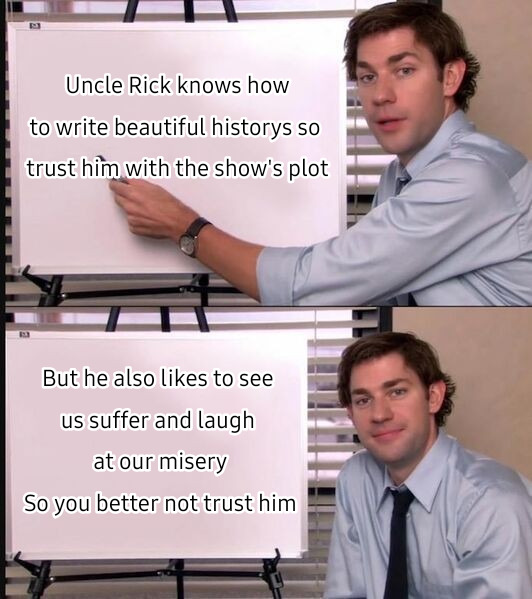
#percy jackson#pjo series#pjo#pjo tv show#percy jackon and the olympians#percy series#rick riordan#uncle rick#Other tip: All the blond characters will die eventually#I write to much “so”
14K notes
·
View notes
Text
Things That May Be Causing Your Writer's Block- and How to Beat Them
I don't like the term 'Writer's Block' - not because it isn't real, but because the term is so vague that it's useless. Hundreds of issues all get lumped together under this one umbrella, making writer's block seem like this all-powerful boogeyman that's impossible to beat. Worse yet, it leaves people giving and receiving advice that is completely ineffective because people often don't realize they're talking about entirely different issues.
In my experience, the key to beating writer's block is figuring out what the block even is, so I put together a list of Actual Reasons why you may be struggling to write:
(note that any case of writer's block is usually a mix of two or more)
Perfectionism (most common)
What it looks like:
You write one sentence and spend the next hour googling "synonyms for ___"
Write. Erase. Write. Rewrite. Erase.
Should I even start writing this scene when I haven't figured out this one specific detail yet?
I hate everything I write
Cringing while writing
My first draft must be perfect, or else I'm a terrible writer
Things that can help:
Give yourself permission to suck
Keep in mind that nothing you write is going to be perfect, especially your first draft
Think of writing your first/early drafts not as writing, but sketching out a loose foundation to build upon later
People write multiple drafts for a reason: write now, edit later
Stop googling synonyms and save that for editing
Write with a pen to reduce temptation to erase
Embrace leaving blank spaces in your writing when you can't think of the right word, name, or detail
It's okay if your writing sucks. We all suck at some point. Embrace the growth mindset, and focus on getting words on a page
Lack of inspiration (easiest to fix)
What it looks like:
Head empty, no ideas
What do I even write about???
I don't have a plot, I just have an image
Want to write but no story to write
Things that can help:
Google writing prompts
If writing prompts aren't your thing, instead try thinking about what kind of tropes/genres/story elements you would like to try out
Instead of thinking about the story you would like to write, think about the story you would like to read, and write that
It's okay if you don't have a fully fleshed out story idea. Even if it's just an image or a line of dialogue, it's okay to write that. A story may or may not come out of it, but at least you got the creative juices flowing
Stop writing. Step away from your desk and let yourself naturally get inspired. Go for a walk, read a book, travel, play video games, research history, etc. Don't force ideas, but do open up your mind to them
If you're like me, world-building may come more naturally than plotting. Design the world first and let the story come later
Boredom/Understimulation (lost the flow)
What it looks like:
I know I should be writing but uugggghhhh I just can'tttttt
Writing words feels like pulling teeth
I started writing, but then I got bored/distracted
I enjoy the idea of writing, but the actual process makes me want to throw my laptop out the window
Things that can help:
Introduce stimulation: snacks, beverages, gum, music such as lo-fi, blankets, decorate your writing space, get a clickity-clackity keyboard, etc.
Add variety: write in a new location, try a new idea/different story for a day or so, switch up how you write (pen and paper vs. computer) or try voice recording or speech-to-text
Gamify writing: create an arbitrary challenge, such as trying to see how many words you can write in a set time and try to beat your high score
Find a writing buddy or join a writer's group
Give yourself a reward for every writing milestone, even if it's just writing a paragraph
Ask yourself whether this project you're working on is something you really want to be doing, and be honest with your answer
Intimidation/Procrastination (often related to perfectionism, but not always)
What it looks like:
I was feeling really motivated to write, but then I opened my laptop
I don't even know where to start
I love writing, but I can never seem to get started
I'll write tomorrow. I mean next week. Next month? Next month, I swear (doesn't write next month)
Can't find the time or energy
Unreasonable expectations (I should be able to write 10,000 words a day, right????)
Feeling discouraged and wondering why I'm even trying
Things that can help:
Follow the 2 min rule (or the 1 paragraph rule, which works better for me): whenever you sit down to write, tell yourself that you are only going to write for 2 minutes. If you feel like continuing once the 2 mins are up, go for it! Otherwise, stop. Force yourself to start but DO NOT force yourself to continue unless you feel like it. The more often you do this, the easier it will be to get started
Make getting started as easy as possible (i.e. minimize barriers: if getting up to get a notebook is stopping you from getting started, then write in the notes app of your phone)
Commit to a routine that will work for you. Baby steps are important here. Go with something that feels reasonable: every day, every other day, once a week, twice a week, and use cues to help you remember to start. If you chose a set time to write, just make sure that it's a time that feels natural to you- i.e. don't force yourself to writing at 9am every morning if you're not a morning person
Find a friend or a writing buddy you can trust and talk it out or share a piece of work you're proud of. Sometimes we just get a bit bogged down by criticism- either internal or external- and need a few words of encouragement
The Problem's Not You, It's Your Story (or Outline (or Process))
What it looks like:
I have no problems writing other scenes, it's just this scene
I started writing, but now I have no idea where I'm going
I don't think I'm doing this right
What's an outline?
Drowning in documents
This. Doesn't. Make. Sense. How do I get from this plot point to this one?!?!?! (this ColeyDoesThings quote lives in my head rent free cause BOY have I been there)
Things That Can Help:
Go back to the drawing board. Really try to get at the root of why a scene or story isn't working
A part of growing as a writer is learning when to kill your darlings. Sometimes you're trying to force an idea or scene that just doesn't work and you need to let it go
If you don't have an outline, write one
If you have an outline and it isn't working, rewrite it, or look up different ways to structure it
You may be trying to write as a pantser when you're really a plotter or vice versa. Experiment with different writing processes and see what feels most natural
Study story structures, starting with the three act structure. Even if you don't use them, you should know them
Check out Ellen Brock on YouTube. She's a professional novel editor who has a lot of advice on writing strategies for different types of writers
Also check out Savage Books on YouTube (another professional story editor) for advice on story structure and dialogue. Seriously, I cannot recommend this guy enough
Executive Dysfunction, Usually From ADHD/Autism
What it looks like:
Everything in boredom/understimulation
Everything in intimidation/procrastination
You have been diagnosed with and/or have symptoms of ADHD/Autism
Things that can help:
If you haven't already, seek a diagnosis or professional treatment
Hire an ADHD coach or other specialist that can help you work with your brain (I use Shimmer; feel free to DM me for a referral)
Seek out neurodiverse communities for advice and support
Try body doubling! There's lot's of free online body doubling websites out there for you to try. If social anxiety is a barrier, start out with writing streams such as katecavanaughwrites on Twitch
Be aware of any sensory barriers that may be getting in the way of you writing (such as an uncomfortable desk chair, harsh lighting, bad sounds)
And Lastly, Burnout, Depression, or Other Mental Illness
What it looks like:
You have symptoms of burnout or depression
Struggling with all things, not just writing
It's more than a lack of inspiration- the spark is just dead
Things that can help:
Forget writing for now. Focus on healing first.
Seek professional help
If you feel like it, use writing as a way to explore your feelings. It can take the form of journaling, poetry, an abstract reflection of your thoughts, narrative essays, or exploring what you're feeling through your fictional characters. The last two helped me rediscover my love of writing after I thought years of depression had killed it for good. Just don't force yourself to do so, and stop if it takes you to a darker place instead of feeling cathartic
#writing#creative writing#writer problems#writing advice#writing community#writing a book#writing problems#novel writing#on writing#writing tips#writing help#writers on tumblr#writers block#female writers#writers of tumblr#writers blog#adhd writer
17K notes
·
View notes
Text
To all my writers who have a tough time with smut terms and not knowing which ones to use, I have found the holy grail for us.
This reddit user, who I've recently found out is @kjscottwrites here on tumblr, took a poll of 3,500 people and went really in depth with asking their favorite terminology, along with actual pie charts on what the readers preferred to see in their smut.
Check out their post with the link to the Google doc here!
#hope yall enjoy😌#share to save a life because god smut is so hard to write😭#fics#fan fiction#fanfiction#writing#writing tips#smut#write#don't mind me#i dunno what else to tag this as
31K notes
·
View notes
Text
I used to work for a trade book reviewer where I got paid to review people's books, and one of the rules of that review company is one that I think is just super useful to media analysis as a whole, and that is, we were told never to critique media for what it didn't do but only for what it did.
So, for instance, I couldn't say "this book didn't give its characters strong agency or goals". I instead had to say, "the characters in this book acted in ways that often felt misaligned with their characterization as if they were being pulled by the plot."
I think this is really important because a lot of "critiques" people give, if subverted to address what the book does instead of what it doesn't do, actually read pretty nonsensical. For instance, "none of the characters were unique" becomes "all of the characters read like other characters that exist in other media", which like... okay? That's not really a critique. It's just how fiction works. Or "none of the characters were likeable" becomes "all of the characters, at some point or another, did things that I found disagreeable or annoying" which is literally how every book works?
It also keeps you from holding a book to a standard it never sought to meet. "The world building in this book simply wasn't complex enough" becomes "The world building in this book was very simple", which, yes, good, that can actually be a good thing. Many books aspire to this. It's not actually a negative critique. Or "The stakes weren't very high and the climax didn't really offer any major plot twists or turns" becomes "The stakes were low and and the ending was quite predictable", which, if this is a cute romcom is exactly what I'm looking for.
Not to mention, I think this really helps to deconstruct a lot of the biases we carry into fiction. Characters not having strong agency isn't inherently bad. Characters who react to their surroundings can make a good story, so saying "the characters didn't have enough agency" is kind of weak, but when you flip it to say "the characters acted misaligned from their characterization" we can now see that the *real* problem here isn't that they lacked agency but that this lack of agency is inconsistent with the type of character that they are. a character this strong-willed *should* have more agency even if a weak-willed character might not.
So it's just a really simple way of framing the way I critique books that I think has really helped to show the difference between "this book is bad" and "this book didn't meet my personal preferences", but also, as someone talking about books, I think it helps give other people a clearer idea of what the book actually looks like so they can decide for themselves if it's worth their time.
Update: This is literally just a thought exercise to help you be more intentional with how you critique media. I'm not enforcing this as some divine rule that must be followed any time you have an opinion on fiction, and I'm definitely not saying that you have to structure every single sentence in a review to contain zero negative phrases. I'm just saying that I repurposed a rule we had at that specific reviewer to be a helpful tool to check myself when writing critiques now. If you don't want to use the tool, literally no one (especially not me) can or wants to force you to use it. As with all advice, it is a totally reasonable and normal thing to not have use for every piece of it that exists from random strangers on the internet. Use it to whatever extent it helps you or not at all.
44K notes
·
View notes
Text
want your favorite author to update but don’t want to be too pushy in their comment section?
here’s 5 things you can do to encourage them:
Reblog their fic link on tumblr (bonus if it’s with tags)
Bookmark the fic with a note about what you’re excited about/love in the fic
Recommend the fic to your friends or local discord channel
Draw art or create other media for the fic (as indicated by the author’s comfort level)
Leave them a comment when re-reading about the parts of the chapter/story that stood out to you the second time
#this isn’t about me#this is just what I think a lot of authors would appreciate#more than the ‘update soon!!!’ comments#fic#fanfic#fanfiction#ao3#archive of our own#writing things#writing#reading things#reading#tips and tricks
32K notes
·
View notes
Text
Writing tips for long fics that helped me that no one asked for.
1.) Don't actually delete content from your WIP unless it is minor editing - instead cut it and put it in a secondary document. If you're omitting paragraphs of content, dialog, a whole scene you might find a better place for it later and having it readily available can really save time. Sometimes your idea was fantastic, but it just wasn't in the right spot.
2.) Stuck with wording the action? Just write the dialog then revisit it later.
3.) Stuck on the whole scene? Skip it and write the next one.
4.) Write on literally any other color than a white background. It just works. (I use black)
5.) If you have a beta, while they are beta-ing have them read your fic out loud. Yes, I know a lot of betas/writers do not have the luxury of face-timing or have the opportunity to do this due to time constraints etc but reading your fic out loud can catch some very awkward phrasing that otherwise might be missed. If you don't have a beta, you read it out loud to yourself. Throw some passion into your dialog, you might find a better way to word it if it sounds stuffy or weird.
6.) The moment you have an idea, write it down. If you don't have paper or a pen, EMAIL it to yourself or put it in a draft etc etc. I have sent myself dozens of ideas while laying down before sleep that I 10/10 forgot the next morning but had emailed them to myself and got to implement them.
7.) Remember - hits/likes/kudos/comments are not reflective of the quality of your fic or your ability to write. Most people just don't comment - even if they say they do, they don't, even if they preach all day about commenting, they don't, even if they are a very popular blog that passionately reminds people to comment - they don't comment (I know this personally). Even if your fic brought tears to their eyes and it haunted them for weeks and they printed it out and sent it to their friends they just don't comment. You just have to accept it. That being said - comment on the fic you're reading now, just do it, if you're 'shy' and that's why you don't comment the more you comment the better you'll get at it. Just do it.
8.) Remove unrealistic daily word count goals from your routine. I've seen people stress 1500 - 2000 words a day and if they don't reach that they feel like a failure and they get discouraged. This is ridiculous. Write when you can, but remove absurd goals. My average is 500 words a day in combination with a 40 hour a week job and I have written over 200k words from 2022-2023.
9.) There are dozens of ways to do an outline from precise analytical deconstruction that goes scene by scene to the minimalist bullet point list - it doesn't matter which one you use just have some sort of direction. A partial outline is better than no outline.
10.) Write for yourself, not for others. Write the fic you know no one is going to read. Write the fic that sounds ridiculous. You will be so happy you put it out in the world and there will be people who will be glad it exists.
22K notes
·
View notes
Text
so rude that fantasizing about writing alone is not enough to actually get the fic done. you have to actually sit down and write it. insane.
#whining about writing instead of actually writing#writeblr#writer#writing#writing memes#writing community#writer’s block#ao3#archive of our own#blorbo#whump#whumpblr#angst#fanfic#fanfiction#writers#writing tips#writing inspo#writing inspiration#whump community#fandoms#fandom#whump blog#trope#tropes#prompt#prompts#writing prompts#whump writing
16K notes
·
View notes
Text
Some of my favorite words and phrases to describe a character in pain
coiling (up in a ball, in on themselves, against something, etc)
panting (there’s a slew of adjectives you can put after this, my favorites are shakily, weakly, etc)
keeling over (synonyms are words like collapsing, which is equally as good but overused in media)
trembling/shivering (additional adjectives could be violently, uncontrollably, etc)
sobbing (weeping is a synonym but i’ve never liked that word. also love using sob by itself, as a noun, like “he let out a quiet sob”)
whimpering (love hitting the wips with this word when a character is weak, especially when the pain is subsiding. also love using it for nightmares/attacks and things like that)
clinging (to someone or something, maybe even to themselves or their own clothes)
writhing/thrashing (maybe someone’s holding them down, or maybe they’re in bed alone)
crying (not actual tears. cry as in a shrill, sudden shout)
dazed (usually after the pain has subsided, or when adrenaline is still flowing)
wincing (probably overused but i love this word. synonym could be grimacing)
doubling-over (kinda close to keeling over but they don’t actually hit the ground, just kinda fold in on themselves)
heaving (i like to use it for describing the way someone’s breathing, ex. “heaving breaths” but can also be used for the nasty stuff like dry heaving or vomiting)
gasping/sucking/drawing in a breath (or any other words and phrases that mean a sharp intake of breath, that shite is gold)
murmuring/muttering/whispering (or other quiet forms of speaking after enduring intense pain)
hiccuping/spluttering/sniffling (words that generally imply crying without saying crying. the word crying is used so much it kinda loses its appeal, that’s why i like to mix other words like these in)
stuttering (or other general terms that show an impaired ability to speak — when someone’s in intense pain, it gets hard to talk)
staggering/stumbling (there is a difference between pain that makes you not want to stand, and pain that makes it impossible to stand. explore that!)
recoiling/shrinking away (from either the threat or someone trying to help)
pleading/begging (again, to the threat, someone trying to help, or just begging the pain to stop)
Feel free to add your favorites or most used in the comments/reblogs!
39K notes
·
View notes
Text
I am going to take a deep breath and just remind you:
Writing is messy, even for the best authors. It's supposed to feel a little uncomfortable, exhilarating, freeing, natural, and terrifying.
It's supposed to inspire you and feel like a too-heavy backpack.
Sometimes, you're going to love being a writer and sometimes, you'll feel so disconnected, you'll wonder if you were ever a writer to begin with.
Give yourself room to make mistakes and hate your work and return to it with renewed confidence that yes, you will get 1% better next time.
It's what we're all going through. Let's speed up the growing process a little by accepting the entirety of it.
#writeblr#writing encouragement#creative writers#writing advice#writing tips#writers of tumblr#creative writing#writing community#writing inspiration#writing help#writing#writers block#writers#writers craft#writers life#writers on tumblr#writers and poets
10K notes
·
View notes